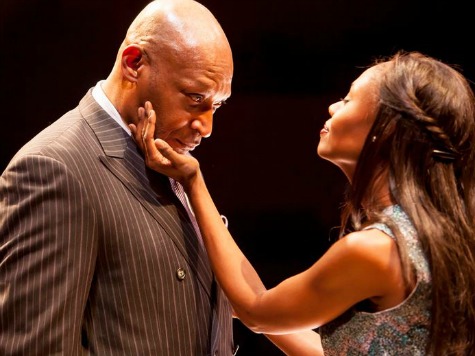
The world premiere of Marcus Gardley’s Black Odyssey doesn’t fit any existing molds, and it should be a disaster because of it.
Part spiritual, part comedy, the production manages to hit a dozen or so grace notes all the same without losing a sense of continuity or style.
Black Odyssey, playing through Feb. 16 at The Space Theatre in Denver, lobs a few partisan grenades along the way, including a sequence calling the Iraq War a mistake built upon lies and the transformation of Trayvon Martin into a modern-day martyr. Yet those moments are fleeting, and what emerges from the wildly original blend of history and Homer’s The Odyssey is a snapshot of the black experience in America that feels complete despite the breadth of the subject.
The play opens with two gods trash talking around a chess board. Poseidon, or “Paw Sidin” (Tony Todd) wants vengeance against Ulysses (Jason Bowen) for killing his son, and the god will manipulate the pieces on the board against Deus (Cleavant Derricks) to make that happen.
Back on Earth, Ulysses is on a quest to return to his Harlem home, a task complicated by Paw Sidin’s meddling and his own mental war wounds. Ulysses fought for the U.S. in Afghanistan, and his battle field days shattered his sense of self.
The narrative jumps through time repeatedly, depositing characters on a rooftop following Hurricane Katrina one moment, and the next in a very ’70s setting complete with a Blaxploitation-style caricature (Derricks).
A mashup of traditionally black musical styles stitches the disparate pieces together with grace, the more buoyant numbers brightening an otherwise dour journey. Gardley’s wicked sense of humor helps. The cast nails each of Gardley’s meaty comic monologues as if they had been waiting months to tear into them.
Todd, best known for his horror movie roles (Candyman), leans on his booming pipes to give Paw Sidin a menace beyond what Gardley penned, and he’s equally slick as a character out to woo Ulysses’ wife.
A running theme involving the shooting death of a young villager during wartime also threatens to turn the production into a partisan affair, but the storyline is joined by so many other elements it gets lost in the narrative Cuisinart.
Nor does a cry mid-production when a key character admonishes Ulysses for his wartime efforts. “Your leaders tell you to maim and kill, and you obey,” he’s told.
Such lines cannot match the intensity of a single mother trying to do right by her teen son, or the comic energy on display when Ulysses is wooed by a woman (Kim Staunton) using her culinary skills as bait.
Black Odyssey will frustrate anyone enamored with linear storytelling, and not every creative chance Gardley takes rises to the occasion. Consider a quirky sequence involving a Superfly-like character which pushes the play’s comedic elements near their breaking point.
Still, we’re rooting for a character to take charge of his life and future, someone who understands the risks and racism of the past but won’t let either slow him down.

COMMENTS
Please let us know if you're having issues with commenting.